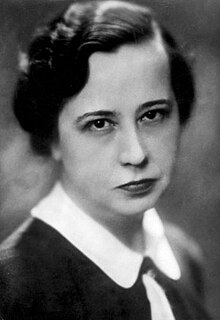
Back كوري تيندلو Arabic Corry Tendeloo French Corry Tendeloo ID Corry Tendeloo Dutch Corry Tendeloo Portuguese Коррі Тенделу Ukrainian 科里·谭德鲁 Chinese
Corry Tendeloo | |
|---|---|
 Tendeloo, c. 1938 | |
| Member of the House of Representatives | |
| In office 20 November 1945 – 18 October 1956 | |
| Member of the Amsterdam City Council | |
| In office 1938–1946 | |
| Personal details | |
| Born | Nancy Sophie Cornélie Tendeloo 3 September 1897 Tebing Tinggi, Sumatra, Dutch East Indies |
| Died | 18 October 1956 (aged 59) Wassenaar, Netherlands |
| Political party | |
| Education | Utrecht University |
Nancy Sophie Cornélie "Corry" Tendeloo (3 September 1897 – 18 October 1956) was a Dutch lawyer, feminist, and politician who served in the House of Representatives for the Free-thinking Democratic League (VDB) from 1945 until 1946 and then for the newly-formed Labour Party (PvdA) until her death in 1956. Born in the Dutch East Indies, Tendeloo studied law at Utrecht University, during which time she made contact with people within the women's rights movement. She became politically active in the 1930's and was elected to the Amsterdam City Council for the VDB in 1938. After World War II, Tendeloo was appointed a member of the House of Representatives for the VDB in the national emergency parliament, formed to rebuild the country and organise elections. In 1946, the VDB merged with other parties into the PvdA, which Tendeloo represented in parliament. She sat on two select committees and spoke in favour of women's rights issues.
She helped secure universal suffrage for the Dutch colonies Suriname and Curaçao in 1948. In early 1955, she successfully made the case for equal pay and later that year put forward a motion to abolish the ban on state employment for married women. The next year she was instrumental in introducing legislation that would start to end the Dutch version of couverture, a 19th-century legal doctrine according to which married women were deemed incompetent to act on their own behalf and were stopped from performing acts such as opening a bank account without the permission of their husband. Tendeloo died in October 1956, before any of the women's rights issues she fought for became law. She was largely forgotten after her death, even during the second wave of feminism in the 1960s and 1970s. In the 21st century efforts have been made to make her achievements better known.
© MMXXIII Rich X Search. We shall prevail. All rights reserved. Rich X Search